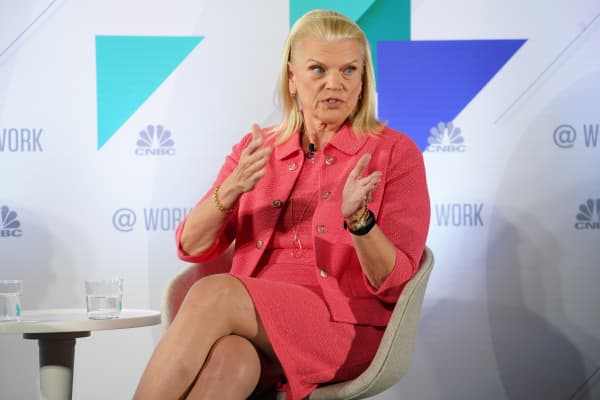
by cnbc — Lori Ioannou — IBM’s Chair, CEO and President Ginni Rometty has a powerful message for workers and employers in all strata of society: The Fourth Industrial Revolution is underway and it is shaping up to be one of the most significant challenges and opportunities of our lifetime. We are already seeing jobs, policies, industries and entire economies shifting as our digital and physical worlds merge. According to the World Economic Forum, the value of digital transformations in the Fourth Industrial Revolution is estimated at $100 trillion in the next 10 years alone, across all sectors, industries and geographies. “As a result, we face an imminent and profound transformation of the workforce over the next five to 10 years as analytics and artificial intelligence change job roles at companies in all industries,” Rometty said while giving a keynote address at the CNBC’s At Work Talent & HR: Building the Workforce of the Future Conference in New York on Tuesday, April 2. In February, the executive was appointed to Trump’s American Workforce Policy Advisory Board along with 24 other leaders.
While only a minority of jobs will disappear, the majority of roles that remain will require people to work with the aid of analytics and some form of AI and this will require skills training on a large scale, Rometty said. “I expect AI to change 100 percent of jobs within the next five to 10 years,” the IBM CEO said. Rometty’s call to action comes at a time when the AI skills gap and the future of work exhibit a growing sense of urgency. The technology sector accounts for 10 percent of U.S. GDP and is the fastest part of the American economy but there are not enough skilled workers to fill the 500,000 open high-tech jobs in the U.S., according to the Consumer Technology Association’s Future of Work survey. Yet the tech industry is concerned that school systems and universities have not moved fast enough to adjust their curriculum to delve more into data science and machine learning. As a result, companies will struggle to fill jobs in software development, data analytics and engineering. “To get ready for this paradigm shift companies have to focus on three things: retraining, hiring workers that don’t necessarily have a four-year college degree and rethinking how their pool of recruits may fit new job roles,” Rometty said.
To address the issue IBM is investing $1 billion in initiatives like apprenticeships to train workers for what it calls “new collar” jobs – a phrase Rometty has coined for workers who have technology skills but not a four-year college degree. She noted the company is crafting 500 apprenticeships with the goal of making this “an inclusive era for employees.” The “new collar” jobs could range from working at a call center to developing apps or becoming a cyber-analyst at IBM after going through a P-TECH (Pathways in Technology Early College High School) program, which takes six years starting with high school and an associate’s degree. IBM is also helping to catalyze a national movement to close the skills gap. IBM and the Consumer Technology Association announced the launch of the CTA Apprenticeship Coalition, to create thousands of new apprenticeships in 20 states in January. It provides frameworks for more than 15 different apprenticeship roles in fast-growing fields, including software engineering, data science and analytics, cybersecurity, mainframe system administration, creative design and program management. New apprenticeships will be modeled in large part on IBM’s successful apprenticeship program, which launched in 2017, is registered with the United States Department of Labor and has grown nearly twice as fast as expected.
The apprenticeships created by this Coalition provide pathways to tech jobs in all parts of the country — from Kansas to Minnesota to Louisiana — not just in traditional tech hubs on the coasts. Its goal is to widen the aperture when it comes to hiring by placing the focus on skills rather than specific degrees. From early-career professionals to mid-career transitions and everything in between, these apprenticeships represent a new pathway to success in 21st century careers, including the growing number of new collar roles where a traditional bachelor’s degree is not always required. They also offer an opportunity to build in-demand skills without taking on student debt. Besides IBM, coalition members include Canon, Ford, Sprint, Toyota and Walmart. In this tight job market, where the talent chase has become so intense, Rometty has some advice for employers at businesses of all sizes. It’s a shift in thinking she has adopted at IBM. “Bring consumerism into the HR model. Get rid of self service, and using AI and data analytics personalize ways to retrain, promote and engage employees. Also move away from centers of excellence to solution centers.” As she sums it up: “In today’s world company’s need to be agile and realize their workforce is a strategic renewable asset.”



